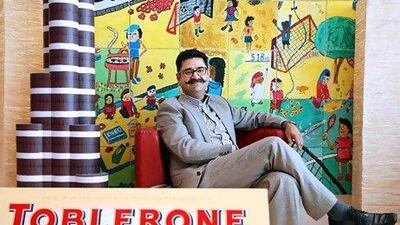Alongside the artefacts you would expect to find in a museum dedicated to Dubai's heritage, there is one item that might be more at home on a supermarket shelf.
But the 100-year-old Kraft cheese can on display in Al Fahidi Fort does help to explain the enduring popularity of the brand here.
"It was used in Dubai a long time ago, so we keep it here," says Salman Bushelaibi, a supervisor at Dubai Museum.
"Kraft cans were imported from Iraq and [Syria] in 1915. They came on commercial boats to Kuwait and Dubai, [which] went to India and Africa and that area."
Originally devised as a way to reduce waste by the entrepreneur James Kraft in the early 1900s, it soon transpired that storing cheese in a can had another benefit: halting the process of deterioration.
And that was a big benefit in countries with soaring summer temperatures and no refrigeration to keep food cool.
"It was traded here from Australia," says Vishal Tikku, the managing director at Kraft Foods GCC, which is due to become part of Mondelez after a spin off on October 1. "Clearly, they had a product solution that made sense for [the Middle East]. It's hot here and you need a shelf-stable solution."
Almost 100 years on, this heritage has helped Kraft amass more than a 60 per cent share of the tinned cheese market and approximately a quarter of the wider cheese market in the UAE.
There are only other two places in the world where Kraft cheese is as popular, says Mr Tikku: Australia and the United States.
Kraft has become so ingrained in the culture it is used as a byword for cheese in bakeries across the country with menus offering treats such as Kraft and honey manakeesh, while supermarket shelves are stocked with Kraft-branded cans, jars and squeezy bottles.
"People get used to tastes," says Mr Tikku.
"Most of the world says 'but this is processed cheese, which isn't the best cheese'. But that is the taste [here]," he adds.
Kraft's long heritage helps to explain why the brand, behind other favourites such as Toblerone, was named as one of the top five most Muslim-friendly companies in a Noor Brand index in 2010, a survey by Ogilvy Noor, an Islamic branding agency.
"Kraft is one of the top brands that have significant heritage in the region," says Tanya Dernakia of Ogilvy Noor. "Not only do such brands create communication relevant to the consumer but, even more importantly, they have created jobs and established relationships with communities."
Under a long-term agreement, the Kraft cheese brand will continue to operate the same way in the GCC as part of Mondelez, Mr Tikku says. "So the GCC consumers will see no change at all in the cheese they love."
But Mondelez will also gain control of another Kraft brand that is big here.
"We have sold Tang [powdered drink] here since the 1960s. It is very similar and doesn't need refrigeration," says Mr Tikku.
Tang has helped the company dominate the powdered beverage market in the GCC.
Its popularity was boosted by the fact that it became associated with Ramadan over time.
"If you fast through the day your sugar levels are down at the end of the day. You need something sweet and refreshing," says Mr Tikku.
Many people break their fast with Tang during the Holy Month, he says. As a result, the company enjoys a rise in sales of about threefold during Ramadan.
"We have very big business in South America, in Brazil, in Argentina, in Mexico, in the US. But here our share is the highest in the world, in excess of 80 per cent share of the powdered beverage market [in the GCC]," says Mr Tikku.
"It's really a loved brand."
After the spin-off, the Dubai operation within Mondelez will become even more prominent within the company, as the largest in the Middle East and Africa. And part of its remit will be to protect the heritage of popular Kraft brands such as Tang.


